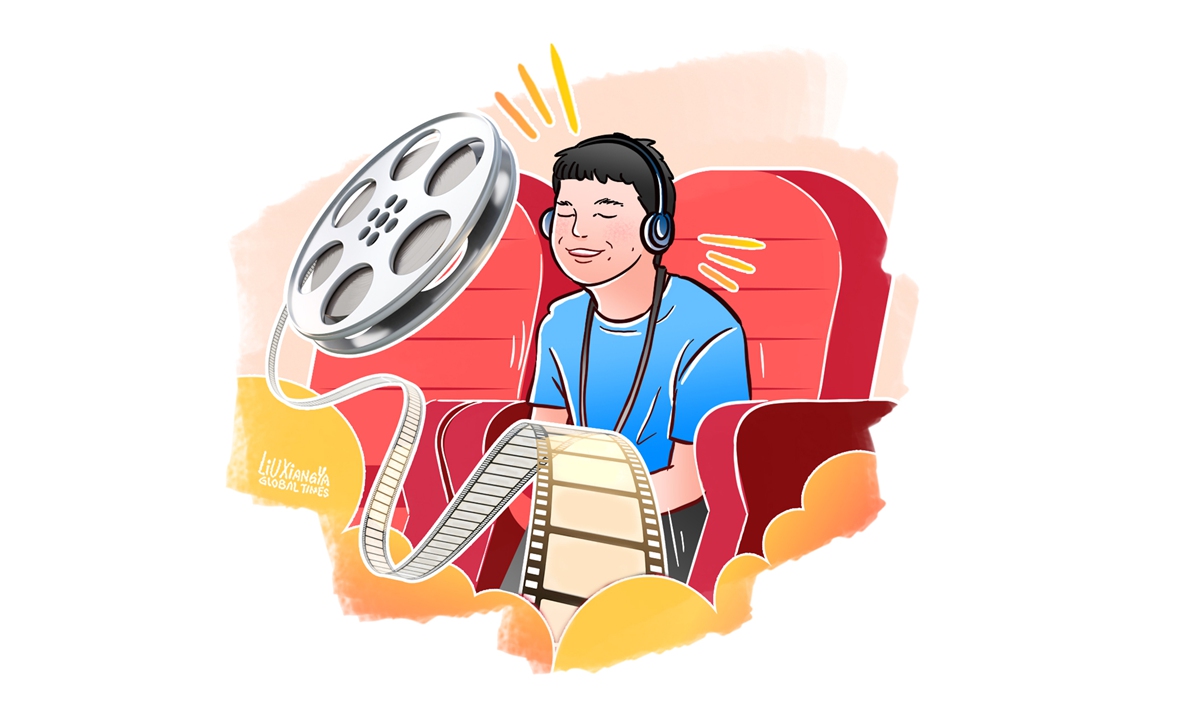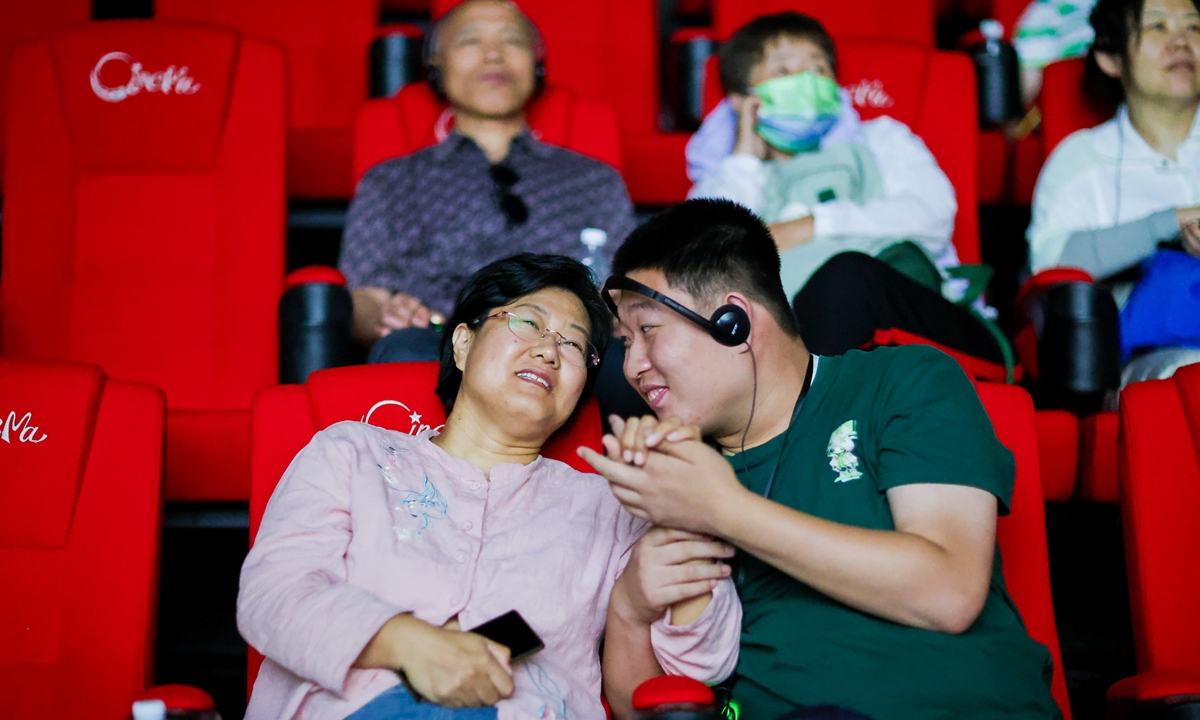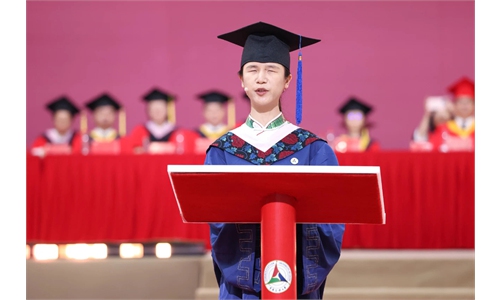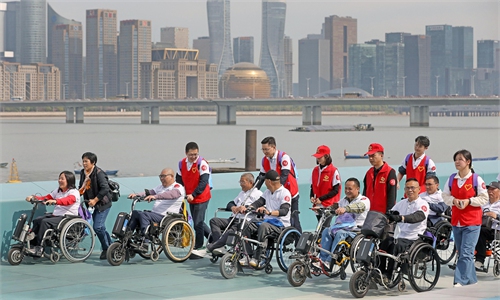ARTS / CULTURE & LEISURE
Tech enables magic of light, shadow
Sitting next to me is a young boy about 10 years old. He has two bright eyes and attractive long eyelashes that sparkle when he talks. In fact, he lost his vision due to optic atrophy caused by a sudden illness in 2018.
Excited and nervous, he kept whispering to his father, "Has the movie started yet?"

Wearing earphones with pre-recorded narrative content, he was waiting to "see" the prescreening of comedy hit Successor with his father and other visually impaired people.
With a little imagination, the boy shared the moments of laughter and joy with us.
"I'm so happy! I want to see another one next time," the boy told his father.
Wearing the same equipment, I tried to share the boy's experience by listening to the voice from the earphones, which narrated everything that happened on the big screen.
After the film, I felt the same way. It was exciting to share this art of light and shadow with people who were enjoying it for the first time.
The Successor and Under the Stranger by director Wu Ershan are the first two movies of the summer that will be released in theaters, on July 13 and July 26, respectively, with accessible narration for the blind.
According to statistics, there are about 17 million visually impaired people in China. With the country's rapid development, their spiritual and cultural needs are increasingly valued by the whole of society.
More and more accessible facilities like barrier-free cinemas, streaming apps, and bookstores are building bridges for them to share in the cultural heritage of the country.
Since the Marrakesh Treaty to Facilitate Access to Published Works for Persons Who Are Blind, Visually Impaired, or Otherwise Print Disabled took effect in China on May 5, 2022, relevant institutions and companies have created an increasingly rich range of accessible film and television works to meet the needs of the visually impaired.

From the Guangming Cinema (Light Cinema), which transforms movies into "accessible versions" that allow the visually impaired to share the experience with others, to various streaming apps aimed at their special needs, more and more new and advanced cultural content services are being provided.
I was able to share the joy with the young boy and other visually impaired friends thanks to the new service jointly launched by the China Braille Library and tech giant Tencent.
Titled "Barrier-free Cinemas," the service, aimed at benefiting China's more than 17 million visually impaired individuals, is scheduled to release over 600 films and TV dramas.
The producers of the two films supported the entire process of providing the two barrier-free films, from providing film sources to distribution and screenings.
In order to stay true to a film, the volunteers watched and mapped out each film, then wrote an explanation script using precise language to ensure it would be the appropriate length.
Visually impaired evaluators participated in trial sessions and put forth suggestions to improve the language, narrative logic, and detailed characterization.
Experts from the Chinese Braille Library also provided guidance throughout the process and worked with volunteers to optimize the final draft.
The Love Cinema project team from the Shanghai Film Distribution and Screening Industry Association recorded the soundtrack based on the script, synthesized it with the original film, and finally produced a barrier-free audio version.
It is a long and multiple-step process, which requires time and effort from various parties and professionals.
However, things have started to change with the introduction of AI large language models, which have increased production efficiency by a factor of three.
"I never had such a memorable afternoon with you for quite a long time, my son," said a voice behind me as I left the theater.
See, society does keep improving inch by inch.
The author is a reporter with the Global Times. life@globaltimes.com.cn
Excited and nervous, he kept whispering to his father, "Has the movie started yet?"

Illustration: Liu Xiangya/GT
Wearing earphones with pre-recorded narrative content, he was waiting to "see" the prescreening of comedy hit Successor with his father and other visually impaired people.
With a little imagination, the boy shared the moments of laughter and joy with us.
"I'm so happy! I want to see another one next time," the boy told his father.
Wearing the same equipment, I tried to share the boy's experience by listening to the voice from the earphones, which narrated everything that happened on the big screen.
After the film, I felt the same way. It was exciting to share this art of light and shadow with people who were enjoying it for the first time.
The Successor and Under the Stranger by director Wu Ershan are the first two movies of the summer that will be released in theaters, on July 13 and July 26, respectively, with accessible narration for the blind.
According to statistics, there are about 17 million visually impaired people in China. With the country's rapid development, their spiritual and cultural needs are increasingly valued by the whole of society.
More and more accessible facilities like barrier-free cinemas, streaming apps, and bookstores are building bridges for them to share in the cultural heritage of the country.
Since the Marrakesh Treaty to Facilitate Access to Published Works for Persons Who Are Blind, Visually Impaired, or Otherwise Print Disabled took effect in China on May 5, 2022, relevant institutions and companies have created an increasingly rich range of accessible film and television works to meet the needs of the visually impaired.

A mother and her visually impaired son enjoy a movie. Photo: Courtesy of Tencent
From the Guangming Cinema (Light Cinema), which transforms movies into "accessible versions" that allow the visually impaired to share the experience with others, to various streaming apps aimed at their special needs, more and more new and advanced cultural content services are being provided.
I was able to share the joy with the young boy and other visually impaired friends thanks to the new service jointly launched by the China Braille Library and tech giant Tencent.
Titled "Barrier-free Cinemas," the service, aimed at benefiting China's more than 17 million visually impaired individuals, is scheduled to release over 600 films and TV dramas.
The producers of the two films supported the entire process of providing the two barrier-free films, from providing film sources to distribution and screenings.
In order to stay true to a film, the volunteers watched and mapped out each film, then wrote an explanation script using precise language to ensure it would be the appropriate length.
Visually impaired evaluators participated in trial sessions and put forth suggestions to improve the language, narrative logic, and detailed characterization.
Experts from the Chinese Braille Library also provided guidance throughout the process and worked with volunteers to optimize the final draft.
The Love Cinema project team from the Shanghai Film Distribution and Screening Industry Association recorded the soundtrack based on the script, synthesized it with the original film, and finally produced a barrier-free audio version.
It is a long and multiple-step process, which requires time and effort from various parties and professionals.
However, things have started to change with the introduction of AI large language models, which have increased production efficiency by a factor of three.
"I never had such a memorable afternoon with you for quite a long time, my son," said a voice behind me as I left the theater.
See, society does keep improving inch by inch.
The author is a reporter with the Global Times. life@globaltimes.com.cn




